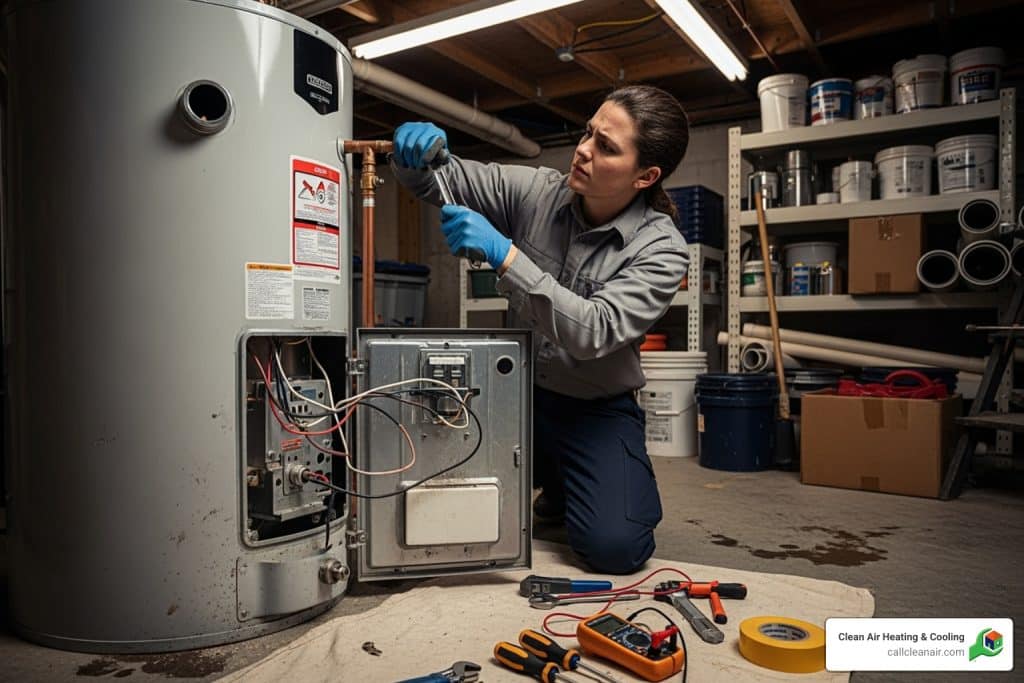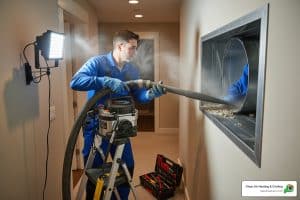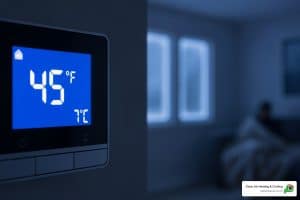Why Water Heater Problems Can’t Wait
Water heater repair becomes urgent the moment you get nothing but cold water. Issues like a failed heating element, faulty thermostat, or sediment buildup disrupt your daily routine and can lead to costly damage if ignored.
Most Common Water Heater Repairs:
- Thermostat replacement – fixes inconsistent temperatures
- Heating element repair – restores hot water supply
- Anode rod replacement – prevents tank corrosion
- Leak repairs – stops water damage
- Sediment flushing – eliminates rumbling noises
- Pilot light service – restores gas heater function
Water heaters typically last 8-12 years, but regular maintenance can extend their lifespan. Repair costs can range from $100 to over $1,700, depending on the problem. While simple fixes like a thermostat adjustment might be DIY-friendly, issues like gas line problems or tank corrosion require immediate professional attention.
Noticing symptoms early prevents minor issues from becoming major expenses. A leaking tank, for example, often means complete replacement is necessary.
I’m Colin Matei, Owner of Clean Air Heating & Cooling. I’ve helped countless Bellingham area homeowners with water heater repair, and my experience shows that understanding common problems helps you make informed decisions about when to call a professional.
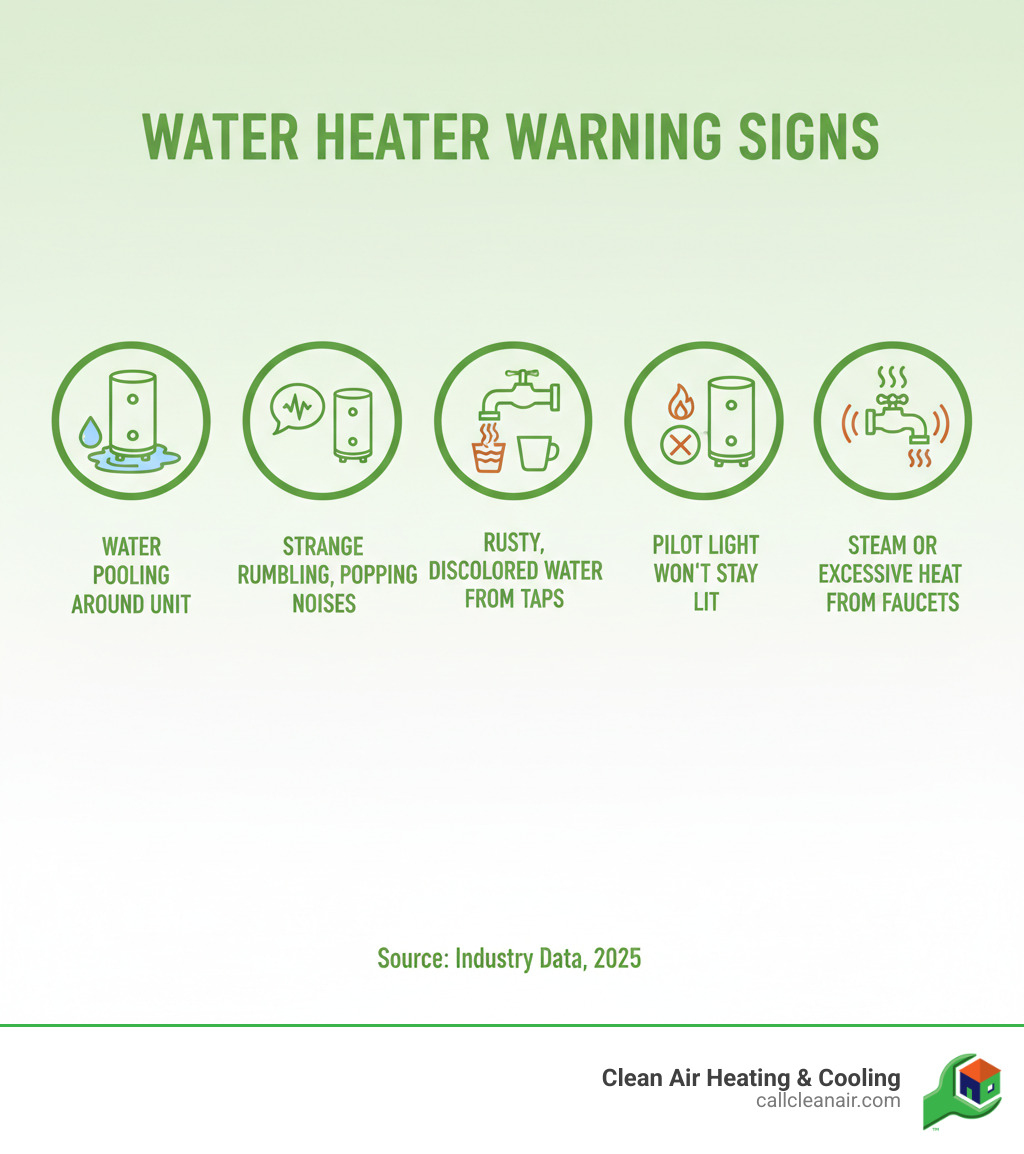
First, The Warning Signs: Is Your Water Heater Failing?
Your water heater usually sends signals before it fails completely. Recognizing these warning signs can save you from a cold shower surprise and help you decide if you need water heater repair or a replacement.
- Strange noises: Rumbling, popping, or banging sounds often mean sediment has built up in the tank. This forces your water heater to work harder, creating steam bubbles that cause the noise.
- Leaks or moisture: While minor condensation can be normal, any pooling water is a red flag. Leaks can come from pipe connections, a faulty pressure relief valve, or the tank itself. A tank leak usually means internal corrosion and requires replacement.
- Inconsistent water temperature: Water that fluctuates between scalding and freezing often points to a faulty thermostat or failing heating elements. No hot water at all is a clear sign of a major problem.
- Discolored or smelly water: Rusty water indicates corrosion inside the tank. A “rotten egg” smell signals bacteria growth.
- Low hot water pressure: If only your hot water pressure is low, mineral buildup may be blocking your pipes.
- Pilot light issues: For gas heaters, a pilot light that won’t stay lit will leave you without hot water.
- Increased energy bills: A sudden spike in your utility costs can mean your water heater is losing efficiency due to failing parts or sediment buildup.
Catching these signs early can turn a potential emergency replacement into a simple water heater repair.
An In-Depth Look at the Top 10 Water Heater Repair Services
Now that we’ve identified the warning signs, let’s dive into the most common water heater repair services that can get your hot water flowing again. Each repair addresses specific symptoms you might be experiencing.
1. Thermostat Repair or Replacement
The thermostat controls your water temperature. If it fails, you might get water that’s too hot or no hot water at all. Electric heaters have upper and lower thermostats, and a faulty sensor can cause temperature fluctuations. First, try a DIY adjustment to 120°F. If that doesn’t work, or if you have a gas thermostat (which is part of the gas valve), it’s time for professional replacement, as gas systems require expert handling.
2. Heating Element Replacement (Electric Heaters)
If you have lukewarm water or you’re running out of hot water quickly, a heating element may have failed. Sediment buildup damage is a common cause, as it creates hot spots that burn out the elements. Testing elements involves high-voltage electricity, so always shut off the power first. Due to the electrical and water-related safety precautions, most homeowners should leave this replacement to a professional.
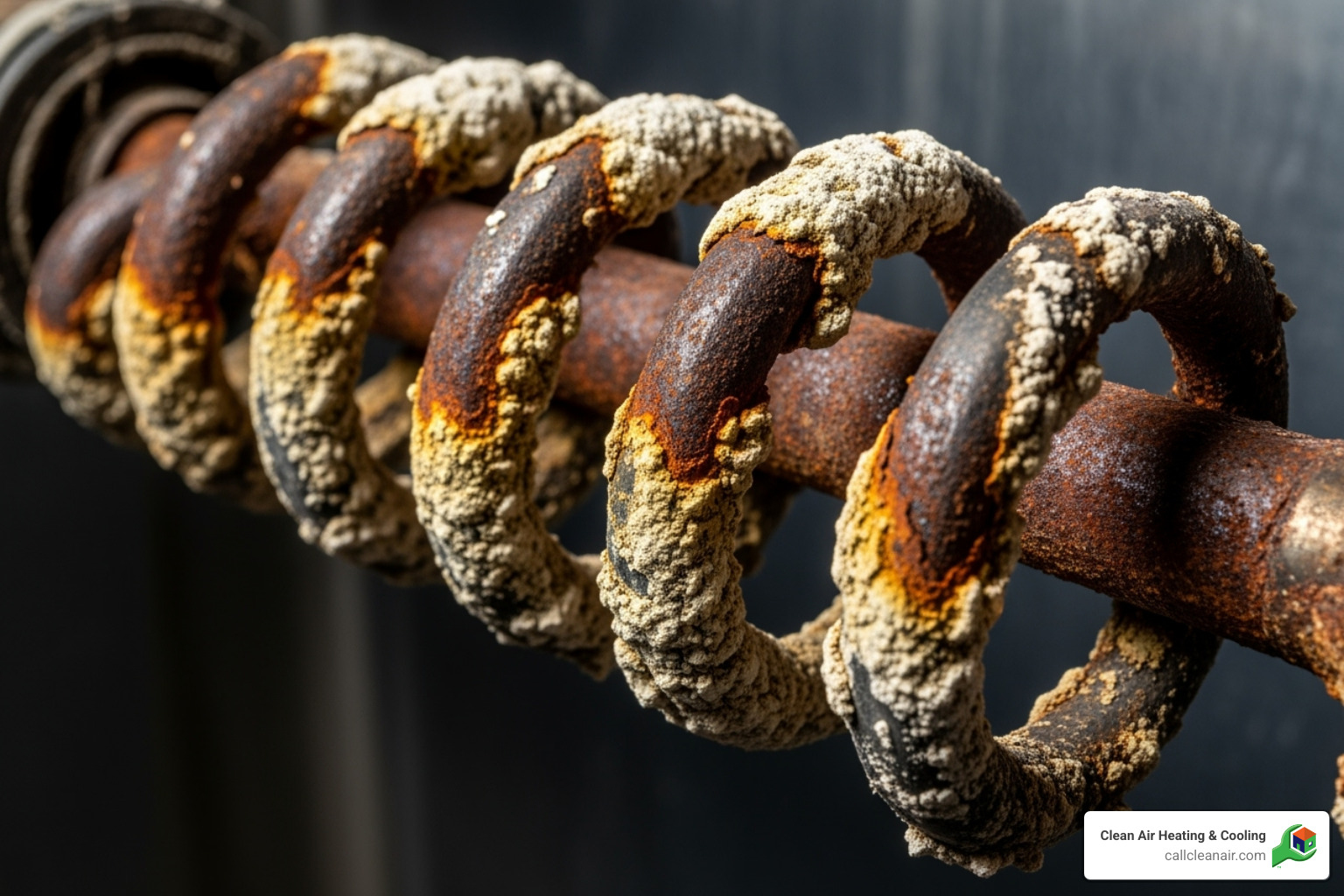
3. Anode Rod Replacement
The anode rod is a sacrificial rod that dissolves to prevent tank corrosion. If you notice rusty water or a rotten egg smell, the rod is likely depleted and your tank has started to corrode. This rod’s sacrificial function provides a major lifespan extension for your heater. Following a 5-year replacement cycle is one of the most cost-effective maintenance tasks you can perform.
4. Leaky Pipe & Connection Repair
Water leaks at top or bottom connections pose a significant water damage risk. Often, these are caused by loose fittings that can be tightened and sealed with fresh Teflon tape. However, cracked pipes may require professional soldering. It’s crucial to distinguish these from a tank leak, which signals internal corrosion and means the unit must be replaced.
5. Temperature & Pressure (T&P) Relief Valve Service
The T&P valve is a critical safety device that prevents dangerous high pressure and temperature buildup. If you see water leaking from the side pipe, the valve may be doing its job or it may be faulty. Testing the valve annually is a smart safety check. If it drips constantly or won’t operate, the replacement process is a safety priority.
6. Tank Flushing & Sediment Removal
Rumbling and popping noises are a sign of sediment buildup, which causes reduced efficiency and an overheating risk. Annual maintenance via tank flushing is a manageable DIY process: connect a hose to the drain valve and let the sediment flow out. For professional service, our Water Heater Service includes a thorough flush and inspection.
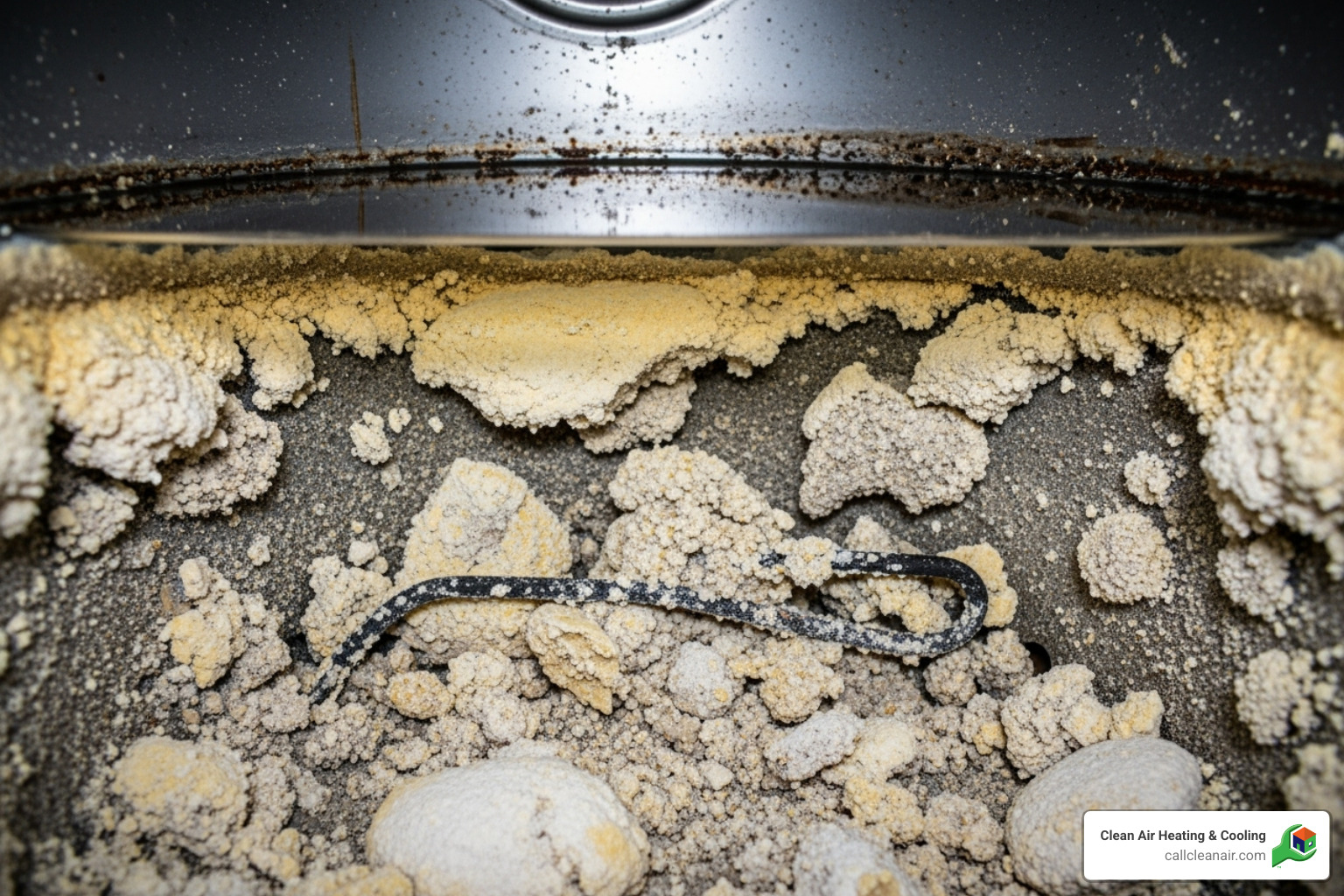
7. Pilot Light & Igniter Repair (Gas Heaters)
For gas heater owners, no hot water often means the pilot won’t stay lit. This is usually due to a dirty pilot assembly or a failing thermocouple. Thermocouple issues are a safety feature; the device shuts off gas flow if it can’t detect a flame. While cleaning the assembly can help, gas safety is paramount. If you smell gas, evacuate and call a professional immediately.
8. Tankless Water Heater Descaling
Tankless units are prone to hard water issues that cause mineral buildup (scale) in their narrow pathways. This leads to reduced flow and error codes. Annual maintenance involves descaling with a special solution to dissolve these deposits. Our guide on Tank vs. Tankless Water Heater explains the different maintenance needs.
9. Drain Valve Replacement
A leaking from the drain valve indicates a worn seal, while a clogged valve prevents routine flushing. When replacing, consider that plastic vs. brass valves differ in durability; brass is more robust. Draining the tank is required for this repair, which can be messy but is essential to stop leaks.
10. Expansion Tank Installation & Repair
Now required by code in many areas, an expansion tank helps manage thermal expansion as water heats up, preventing pressure damage to your plumbing. A leaking expansion tank can no longer absorb pressure and needs to be replaced. This is a job for a professional to ensure proper installation and pressure settings.
Understanding these common water heater repair needs helps you recognize problems early and decide between DIY and professional service.
DIY Fixes vs. Professional Water Heater Repair
When your water heater acts up, you must decide: fix it yourself or call a pro? Knowing the difference between a simple fix and a dangerous problem is key to avoiding a costly disaster.
Simple Fixes You Can Try Yourself
Before calling for service, try these basic troubleshooting steps for water heater repair:
- Press the reset button: On an electric water heater, a tripped reset button (usually red, near the thermostat) can cut power. Press it firmly to see if it restores hot water.
- Check your circuit breaker: A tripped breaker is a common reason for an electric heater to stop working. Check your electrical panel for any flipped switches.
- Adjust the thermostat to 120°F: This temperature is the ideal balance of safety and efficiency. It can resolve issues of water being too hot or lukewarm.
- Tighten pipe connections: Small leaks at pipe fittings can sometimes be stopped by gently tightening them with a wrench. Be careful not to over-tighten.
When to Immediately Call for Professional Water Heater Repair
Some repairs are too dangerous for a DIY approach and require a professional.
- Gas smell: If you smell gas, evacuate your home immediately and call your gas company and emergency services. Gas leaks are life-threatening.
- Major leaks: Water pooling around the unit, especially from the tank itself, indicates internal corrosion. This almost always requires a full replacement.
- Electrical work: Complex issues like faulty wiring or heating element replacement involve a dangerous combination of water and electricity. Leave this to a qualified technician.
- Tank corrosion: Rusty water is a sign that the tank’s protective lining has failed and the unit needs to be replaced.
- Persistent pilot light issues: While relighting a pilot is simple, recurring problems with the pilot or igniter on a gas heater require professional service due to gas safety concerns.
Water heater repair can involve high temperatures, gas, and electricity. When in doubt, call a professional. Our team at Clean Air Heating & Cooling is ready to help with all your HVAC Services: Water heaters needs.
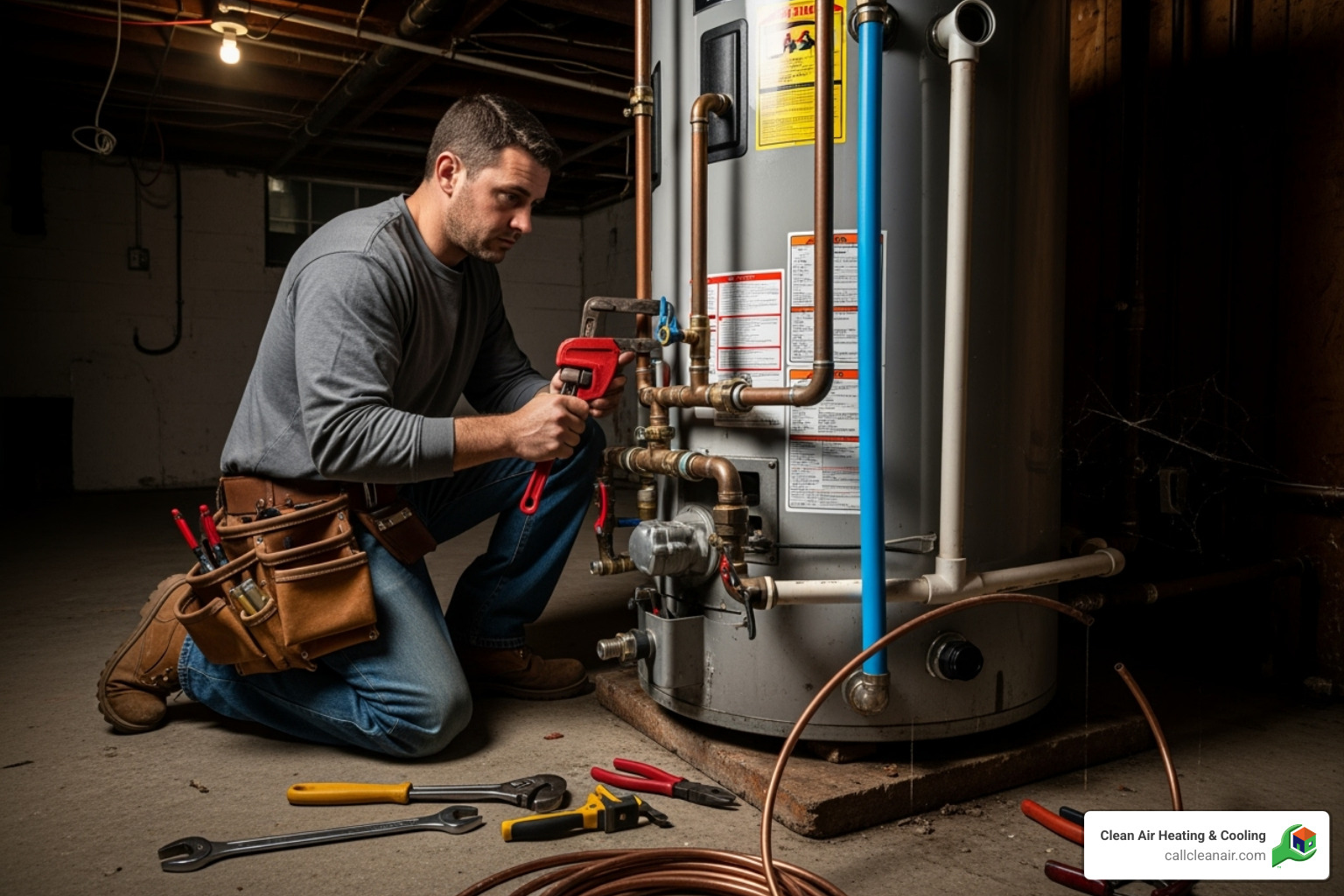
The Big Decision: Should You Repair or Replace?
Standing in front of your aging water heater, trying to decide whether to invest in yet another water heater repair or bite the bullet and replace the whole unit, can feel overwhelming. Trust me, I’ve helped countless homeowners work through this exact dilemma, and there’s no one-size-fits-all answer.
The decision really comes down to a few key factors that I always walk my customers through. Age is probably the biggest factor – if your water heater is approaching or has passed the 8-12 year mark, it’s entering the danger zone. Some units can limp along for 15 years, but they’re usually costing you more in energy bills and repairs than they’re worth.
| Criteria | Repair | Replace |
|---|---|---|
| Age of Unit | Less than 8-10 years old | 8-12 years old or older (typical lifespan) |
| Cost of Repair | Repair cost is less than 50% of a new unit | Repair cost is 50% or more of a new unit |
| Frequency of Repairs | Infrequent, isolated incident | Frequent breakdowns, multiple repairs needed |
| Nature of Problem | Minor component failure (thermostat, element, valve, anode rod) | Leaking tank (internal corrosion), major structural damage, gas/electrical system failure |
| Energy Efficiency | Existing unit is still reasonably efficient | Existing unit is old and inefficient, leading to high utility bills |
| Hot Water Supply | Adequate hot water after repair | Inadequate hot water, even after minor repairs (undersized unit) |
Here’s my general rule of thumb: if the repair costs more than half the price of a new unit, replacement usually makes more sense. A simple thermostat replacement or heating element swap on a 6-year-old unit? That’s a no-brainer repair. But if you’re looking at multiple expensive fixes on a 10-year-old tank, you’re probably throwing good money after bad.
The nature of the problem matters enormously too. A leaking tank is almost always game over – that internal corrosion can’t be fixed, only replaced. On the other hand, issues like a faulty anode rod, clogged drain valve, or worn heating element are totally worth fixing on a younger unit.
I also tell homeowners to think about how often they’re calling for service. If you’re on a first-name basis with your water heater repair technician because you’re calling every few months, your unit is trying to tell you something important. Those frequent breakdowns are usually a sign that major components are failing throughout the system.
Energy efficiency is where replacement really shines. The difference between a 12-year-old water heater and today’s models is dramatic. Modern units are so much more efficient that many homeowners see their energy bills drop significantly right away. When you factor in those monthly savings over the life of the unit, replacement often pays for itself.
Opening up Savings with a New Water Heater
Here’s where things get exciting – upgrading to a new water heater isn’t just about getting reliable hot water again. Energy Star certified models can dramatically cut your utility costs, sometimes by hundreds of dollars per year depending on your usage and local energy rates.
The real game-changer is taking advantage of the rebates available right now. We help our customers steer programs like Electric Water Heater Rebates, PSE Heat Pump Water Heater Rebate, and other Heat Pump Water Heater Rebate opportunities. These incentives can knock hundreds or even over a thousand dollars off your upfront costs.
Heat pump water heaters are particularly impressive – they use about 60-70% less energy than conventional electric models. Yes, they cost more upfront, but between the rebates and energy savings, most homeowners break even within a few years and then enjoy lower bills for the life of the unit.
The bottom line? If your water heater is getting up there in age and giving you trouble, replacement often makes more financial sense than you might think. Plus, there’s something to be said for the peace of mind that comes with a new, warrantied system that you won’t have to worry about for years to come.
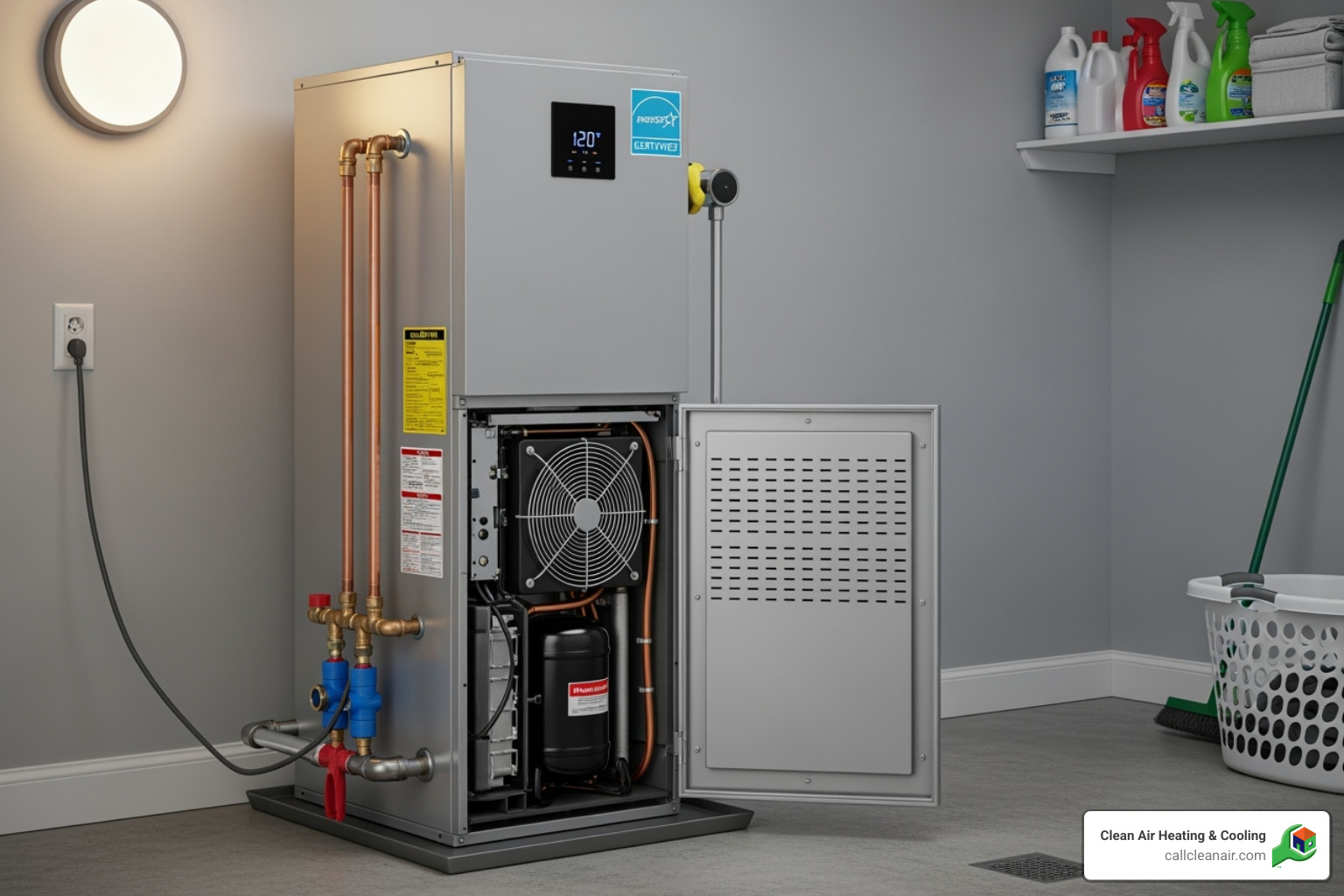
Frequently Asked Questions about Water Heaters
Over the years, we’ve heard just about every water heater repair question you can imagine. Whether you’re dealing with mysterious smells, wondering how long your unit should last, or looking for ways to squeeze more life out of your current system, these are the questions that keep coming up in our service calls.
What causes smelly or discolored water?
Nothing quite ruins your morning shower like turning on the tap and getting a face full of rusty, smelly water. The good news? There’s usually a straightforward explanation for what’s happening in your water heater.
Sediment buildup is often the first suspect when your hot water looks cloudy or rusty. Those mineral deposits we’ve talked about don’t just make noise – they can also discolor your water, especially if your tank is starting to show its age and the interior coating is wearing thin.
That infamous rotten egg smell is almost always bacteria having a party in your water heater tank. These little troublemakers react with your anode rod (particularly magnesium ones) and produce hydrogen sulfide gas. Here’s a quick test: if only your hot water smells but your cold water is fine, the problem is definitely in your water heater, not your main water supply.
Anode rod corrosion can contribute to both issues. When this protective rod gets depleted, your tank starts to rust from the inside out, leading to that telltale rusty water. Sometimes the rod itself can react with certain water conditions and create sulfur-like odors.
If you’re curious about other water quality issues beyond your water heater, the University of Georgia Extension has some excellent resources about household water odors and what they mean.
What is the typical lifespan of a water heater?
This is probably the most common question we get during water heater repair calls, especially when homeowners are trying to decide whether to fix or replace their unit.
Tank-style water heaters typically give you about 8 to 12 years of reliable service. Now, this isn’t set in stone – we’ve seen some well-maintained units push 15 years, while others barely make it to 6 years. The difference usually comes down to water quality, how hard your water heater works, and whether it gets regular maintenance.
Tankless water heaters are the marathon runners of the water heating world. With proper care, these units can keep going for 20 years or even longer. They don’t have to deal with the constant stress of storing hot water, which means less wear and tear on the internal components.
Several factors can push your water heater’s lifespan up or down. Hard water is particularly tough on water heaters, causing faster sediment buildup and more frequent component failures. Heavy usage – like in large families or homes with multiple bathrooms – can also shorten lifespan. On the flip side, regular maintenance and quality installation can help your unit reach or exceed its expected lifespan.
How can I make my water heater last longer?
Here’s where a little prevention goes a long way toward avoiding frequent water heater repair calls. Think of your water heater like a car – regular maintenance keeps it running smoothly and helps you avoid expensive breakdowns.
Annual tank flushing is hands down the most important thing you can do. Those mineral deposits don’t just disappear on their own, and they’re working against you every day they sit in your tank. Flushing removes this sediment before it can cause real damage to your heating elements or tank lining.
Anode rod inspection should be on your maintenance checklist too. We recommend checking this sacrificial component every few years and planning for replacement around the five-year mark. It’s a relatively inexpensive part that protects your entire tank from corrosion – definitely worth staying on top of.
Setting your thermostat to 120°F hits the sweet spot between having plenty of hot water and not overworking your system. Higher temperatures don’t just waste energy; they put extra stress on all your water heater’s components.
Professional maintenance can catch the little issues before they turn into big problems. Our technicians can spot early warning signs, test safety components like the T&P valve, and ensure everything is operating efficiently. It’s like having a yearly physical for your water heater – a small investment that can save you from major water heater repair headaches down the road.
The bottom line? A well-maintained water heater doesn’t just last longer – it runs more efficiently, saves you money on energy bills, and gives you reliable hot water when you need it most.
Conclusion
When your morning shower turns into an arctic adventure, you quickly realize just how much you depend on that trusty water heater tucked away in your basement or utility closet. Through this guide, we’ve explored the most common water heater repair scenarios you might encounter, from mysterious rumbling sounds to that dreaded moment when only cold water flows from your taps.
The most important lesson? Don’t ignore the warning signs. Those strange noises, rusty water, or inconsistent temperatures are your water heater’s way of asking for help. Catching problems early can mean the difference between a simple thermostat adjustment and a complete system replacement.
While some fixes like resetting a tripped breaker or adjusting your thermostat to 120°F are perfectly safe DIY tasks, others require professional expertise. Safety always comes first – especially when dealing with gas lines or electrical components. There’s no shame in calling for help when you smell gas or encounter major leaks.
Regular maintenance truly is your water heater’s best friend. Annual tank flushing and anode rod inspections aren’t just suggestions from overeager technicians – they’re proven ways to extend your unit’s lifespan and keep those utility bills manageable. Think of it as giving your water heater a yearly check-up, just like you would for your car.
When facing that tough repair-versus-replace decision, remember the key factors: age, repair costs, and frequency of breakdowns. A 12-year-old unit that needs its third repair this year is probably trying to tell you something. Sometimes the kindest thing you can do is let it retire gracefully and upgrade to a more efficient model.
For residents in Whatcom, Skagit, Snohomish, and San Juan Counties, you don’t have to tackle these challenges alone. At Clean Air Heating & Cooling, we’ve built our reputation on understanding exactly what Pacific Northwest homeowners need from their water heating systems. Our 480+ five-star Google reviews reflect our commitment to getting the job done right the first time.
We’re not just about fixing problems – we’re about preventing them. Our 25% utility savings guarantee means we’re invested in your long-term satisfaction, not just a quick fix. Whether you need emergency water heater repair, routine maintenance, or guidance on upgrading to a more efficient system, our team brings both expertise and genuine care to every service call.
Don’t let water heater troubles disrupt your daily routine any longer. Contact us for expert water heater services and let us restore the comfort and reliability you deserve. After all, everyone deserves a hot shower at the end of a long day.

